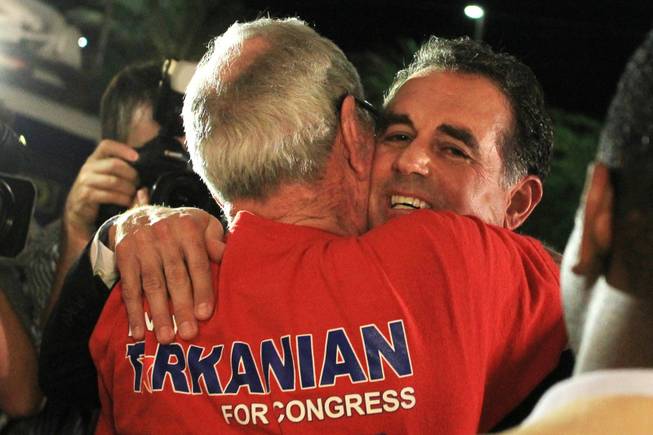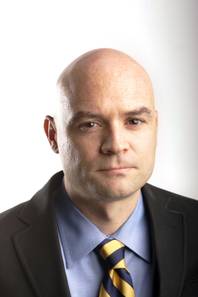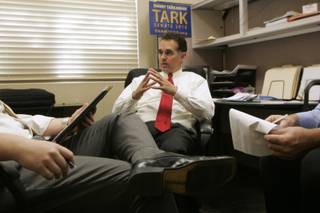
Congressional candidate Danny Tarkanian gets a congratulatory hug from a supporter at his primary election night party at Born and Raised tavern, Tuesday, June 12, 2012. Tarkanian will face Steven Horsford in the general election.
Thursday, Oct. 4, 2012 | 2 a.m.
View more of the Sun's opinion section

J. Patrick Coolican
If the voters of Nevada’s newly created Congressional District 4 aren’t careful, they could wind up with a congressman who is in bankruptcy. But that’s just the start of the weirdness. They’ll also have a congressman who is being sued by an independent agency of the federal government.
I’m speaking of Danny Tarkanian, son of the legendary UNLV basketball coach and the perpetual Republican candidate. He’s lost three political campaigns since 2004.
This time, given a significant name recognition advantage over his opponent, state Senate Majority Leader Steven Horsford, he’s again in the hunt and leading in some polls.
As voters in the district make their decision, they will have to consider that the Federal Deposit Insurance Corporation claims Tarkanian owes it $17 million, and a federal judge agrees.
Let’s review how Tarkanian and his family got themselves into this bind.
As my former colleague Michael Mishak reported during Tarkanian’s failed 2010 Senate bid, Tarkanian was approached by a friend and business partner in 2007 to invest in Dignitary Downs, an “equestrian destination resort” in Anza, Calif., complete with a 200-room hotel, restaurant and jockey school.
The Tarkanian family company, Diamond Properties, would play the role of “hard money lender.” It would borrow money from La Jolla Bank, using its own property as collateral, and then lend it to the developer at high interest. This was faddish during the boom, especially for “unconventional” development schemes — such as, say, a horse resort — that couldn’t get regular financing.
Tarkanian personally guaranteed the loan from La Jolla Bank, which means he was on the hook. He used a nearly 9-acre undeveloped parcel near the M Resort as collateral. Needless to say, it’s worth a fraction of what it was in 2007.
Horse resort ... Anza, Calif. ... hard money loan ...2007 ... La Jolla Bank: This is a thickly stacked failure sandwich.
Almost immediately, the developer went into default. Sadly, there would be no horse resort after all.
Meanwhile, La Jolla Bank failed and was seized by the FDIC, the independent government entity that insures depositors and supervises the soundness of banks, managing them when they fail.
Quick review of the FDIC: When you deposit money in a bank, up to $250,000, it’s insured by the FDIC. So when a bank fails, the FDIC goes after money owed to the bank so that depositors can get their money. It’s one of the institutions created during the Great Depression that is an important pillar of a stable banking system.
With the FDIC having seized La Jolla Bank, Tarkanian and his business partners now owed all that money to the FDIC.
Tarkanian countersued, alleging he was defrauded by the developer who, he said, was in cahoots with the bank.
A federal judge ruled against the Tarkanians in a summary judgment in May, which is the legal equivalent of the referees stopping the game at halftime because it’s such a blowout.
The government foreclosed on the property that the Tarkanians were using as collateral. It was sold at auction for $3.2 million, far less than what it was worth in 2007 when it was used as collateral.
That means the Tarkanians are still on the hook for $17 million, as a judge declared in May.
Tarkanian’s counsel now argues that California law requires that the government forgive the remainder of the debt following the auction of the land. The government disagrees, noting that this kind of “anti-deficiency” protection doesn’t apply in this case because of Tarkanian’s personal guarantee.
I spoke to Tarkanian campaign spokesman Ron Futrell, who said the judge’s decision isn’t “binding,” which I’m sure would come as a surprise to the judge. What Futrell meant was that with the appeal, the ruling isn’t final, which is true. He said that given the appeal, the litigation will go on for years and thus won’t force Tarkanian into bankruptcy anytime soon.
Futrell said the real story is that the FDIC is pursuing Tarkanian for political reasons. (On this point, he said that’s his personal opinion and that he wasn’t speaking for Tarkanian.)
The FDIC doesn’t comment on ongoing litigation, but a spokesman noted that the agency is pursuing litigation against 647 individuals nationwide.
“Danny is always going to be out there as a fighter. He believes he’s right about this case,” Futrell said.
I asked to speak to Tarkanian directly. I never heard back. Calls to Tarkanian’s attorney were not returned.
Bottom line: This doesn’t look good for Tarkanian, who has acknowledged he doesn’t have the money for a bond against the $17 million and would become insolvent if the FDIC is successful.
If this occurs and Tarkanian wins the election, Nevada would be something of a national embarrassment. We would be sending to Congress a man who owes the government millions of dollars and, presumably, will be forced to declare bankruptcy because he can’t pay.
Also, Tarkanian seemingly would be caught in a web of conflicts of interest. He’d be working in one branch of government while in hock to a government agency. He’d be voting on issues — specifically regulation of the financial services industry — that are bound up with his personal money problems.
The question I have for Tarkanian, who has lent his campaign some of his own money: Why are you running for Congress when you should be getting your personal affairs in order?
Who knows? Maybe he thinks the FDIC will stand down if he makes it to Congress.
And maybe that horse resort will prosper after all.
Sun researcher Rebecca Clifford-Cruz contributed to this column.


Join the Discussion:
Check this out for a full explanation of our conversion to the LiveFyre commenting system and instructions on how to sign up for an account.
Full comments policy